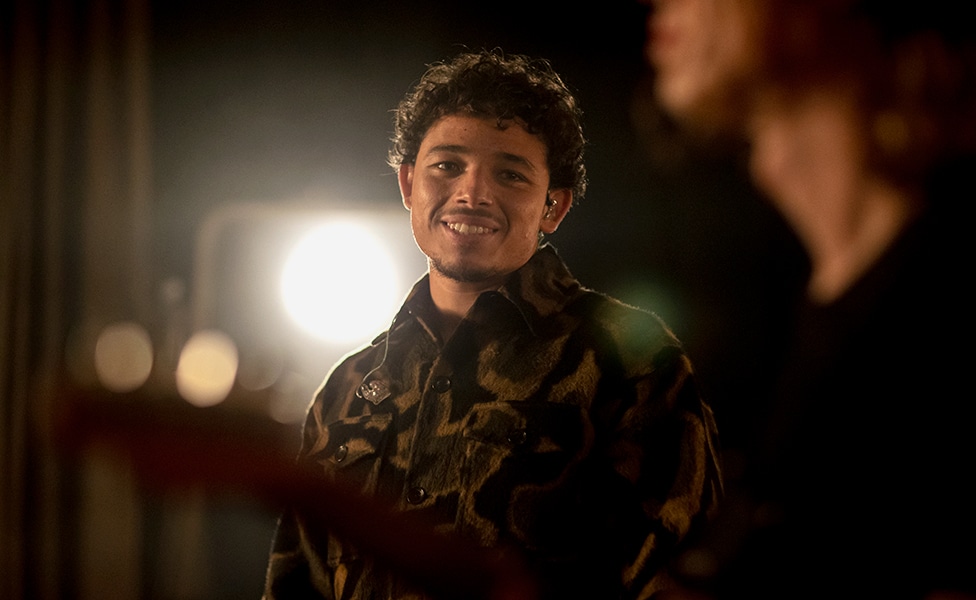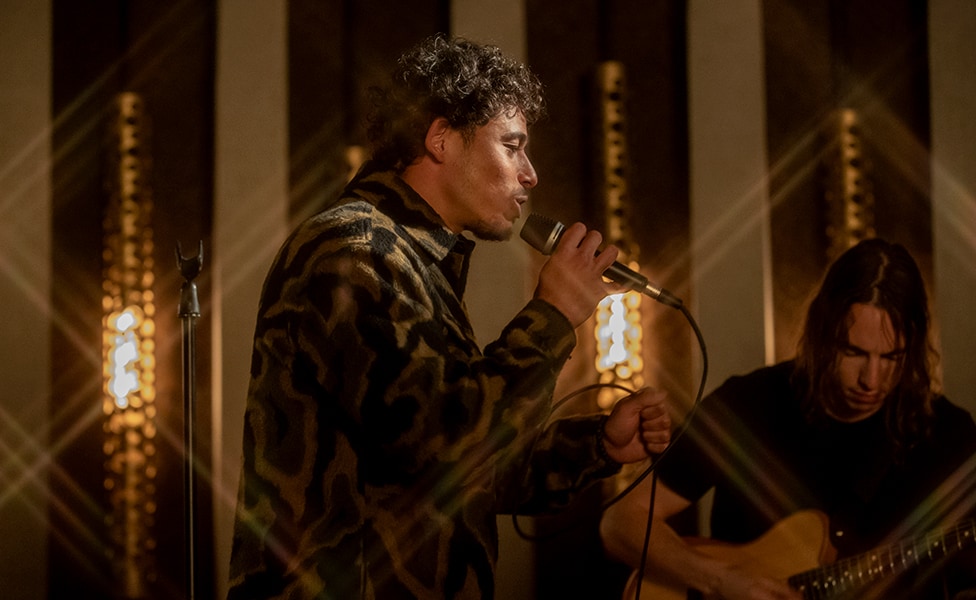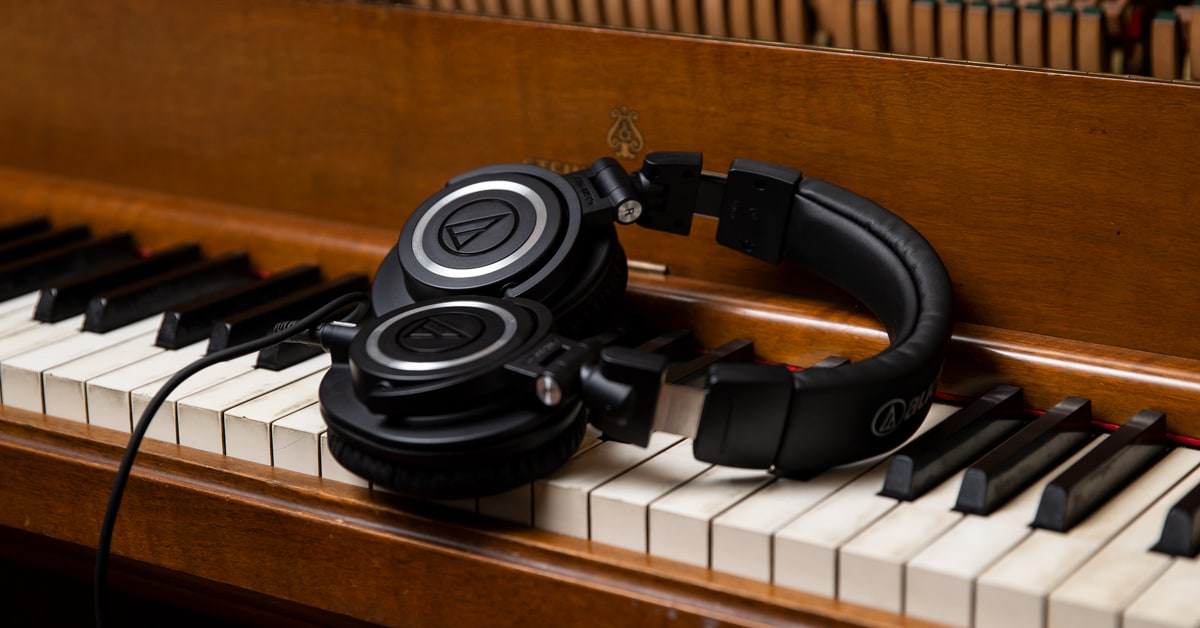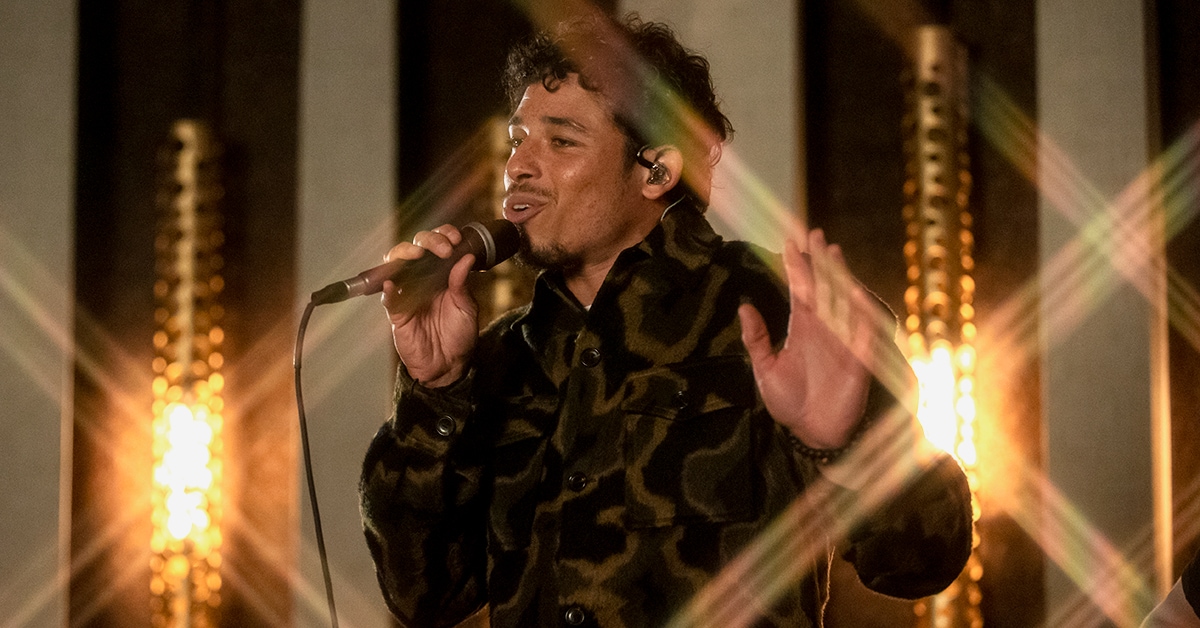The Brooklyn-born musician, actor and singer Anthony Ramos has also stepped into his own with two solo albums, The Good & The Bad and Love and Lies. Known for an expressive blend of styles from contemporary pop, latin and R&B, Ramos continues to build a loyal following with his soulful voice and captivating songwriting. He spoke to us about his humble beginnings, why he loves to collaborate, and his process behind writing and recording music.
As a performer and an artist, you thrive in multiple mediums, but music is your first love and very much at the core of who you are. What was the first thing you remember drawing you to music?
I don’t remember the first thing that drew me to music, but I do remember music always being the thing that I turned to, whatever mood I was in. If I was happy, I listened to music. If I was sad, I listened to music. I played baseball growing up, and I’d listen to songs before games to get me in the zone. I remember being really little and listening to The Temptations and the Four Tops, and my mom playing Hector Lavoe and Tito Nieves. There was always music in my life.
You started making beats and recording vocals with your cousins at your aunt’s apartment. What were those early songwriting experiences like?
I was in ninth grade when I wrote my first song. It was a song called “What You Mean to Me” from a beat my cousins and I stole off the internet. We used to burn beats off the internet, drag it into Windows Media Player, which we had on a desktop computer, and then we had this small mic. It barely extended from the back. Like, you couldn’t just bring the mic up and sing. We had to lean over and then record the song in one take, because we didn’t have any programs. There was a voice record app on the computer, and we would hit the voice record app, hit play on the beat, and then record the song in one take. If we couldn’t get it in one take, then we’d have to start over. So, we’d be up sometimes all night recording these songs. It was a dope challenge now looking back in hindsight. You’re like, “dang, we really had to record that joint in one take.”
Is there anything from that formative time that still influences how you approach music today?
If I could think of anything I took from that time that I bring to now, it’s remembering how much fun I was having. Music is a game of sharing, right? People play that game in a different way, and some people are more sharing than others. Some people are more vulnerable. Some people hit it off better than others. Try to write songs with people you really want to be around on a human level. It’s just going to make the process enjoyable. If you’re having fun doing it, you’re winning. The songs I wrote in 2021 with my closest friends felt like the thing that was closest to me, and I had so much fun. I said, “Those are the songs that I want to sing on tour.”

How has music helped shape you?
Music’s given me the courage to dig inside myself. It was always a form of therapy for me. It felt like a safe space for me to actually dig inside and examine where I was or where I am. Sometimes I write a song, and I’m like, “Man, I didn’t even know I was feeling that.” Especially as a kid, I was afraid to say what was on my mind because I was afraid of how it would make someone else feel. Music gave me the courage to really be open about how I’m doing for real. If you really dive in and allow yourself to do it, music can really help you get to the core of whatever’s going on with you.
How did you develop your voice? Were there vocalists that were influential to you?
My first voice lesson was when I was 18 in college. I developed my voice really in school. I listened to John Legend, Brian McKnight and gospel singers like Smokie Norful. I would try to imitate their runs, and I would listen to their stuff over and over and over and over. Eventually, I had my first voice lesson, and that was when I really started to explore what my voice was.
There’s always a really great interplay with your voice and the melody around it. How important is a good groove for finding the right place to drop your vocals?
I know how to wrap my voice around the beat. I’ll sing a song differently in certain gigs depending on if we catch a pocket and I hear Al, our drummer, playing something a little different from what he usually plays. If Xela, on guitar, is playing something or Will, on the keys, is catching a vibe. It’s like, just let the music kind of tell you where you need to go. And when I’m recording in the booth, I try to do that. We’ll pick the melodies that feel like something. We’ll start cutting them up in Logic and be like, “Yo, that melody is fire. That sounds like a good verse. That sounds like a good chorus. Those two sound like a bridge. Let’s put those off to the side, and then we’ll flip-flop and see which one sounds better.”
What is your essential setup? What gear do you need to make music?
When I’m working on songs, and especially when I want to get melodies out, the Shure SM7B microphone is my favorite thing. You’re walking around the studio and messing around with melodies, whatever, you can still put it down. You know, you put it down into Logic. Or also voice memos, right? If somebody catches some magic and there’s no SM7B around: “Yo, yo, yo, hold up. Sing that.”
What do you love most about making your own music?
There’s nothing like creating a song. There’s this exhilarating feeling that you get when you walk in the studio and there’s nothing on the page, right? And you walk out with a full thought. That journey is exciting for me.
Your latest album, Love and Lies, has a wide range of sounds ranging from Pop, Latin and R&B. What was important to you about the sound on this album?
I really wanted to explore all the genres of music that I love, that have influenced me my whole life. R&B, straight up the middle pop. Songs like “Blessing” that are inspired by Afrobeat. Songs like “Love and Lies,” the title track, which is inspired by freestyle. This is essentially a pop album, but there are flavors of these other genres in every song. Like, “Échale,” which is pop, but more Latin leaning, and you got “Right Now,” which I wrote with Andrews and Mauricio, these amazing songwriter producers from Columbia.
Every song is a reflection of a style of music I love. I said, “I’m going to put these together so that they feel like one complete thought and one complete body of work.” I feel like we arrived at 12 tracks that feel like a complete thought—one complete thought and one complete vibe. That was the thing I was going for in this album, too. I just want people to vibe. I want them to have all the different flavors. When I listen to it, if the vibe is cohesive, then we won. It doesn’t matter if this song is freestyle, that one is reggaetón, that one is more whatever. Does the album feel like a complete thought? Does it feel like a complete vibe top to bottom? Do I want to listen top to bottom? And that, for me, is the most important thing. It was so much fun to make because I can listen to these songs and be like, yeah, that’s the smack, that’s the smack.
What was important to you about who you picked as collaborators on this album? How did you develop those musical partnerships?
Starting off with Will Wells, we’ve been friends since 2016. I was in Hamilton on Broadway. He was part of the music team, and we hit it off. He heard me sing onstage and was like, “Yo, you ever made a record? Like, have you ever thought about making a record?” I was like, “Yeah, I would like to, but I haven’t done it.” And he’s like, “Yeah, we should write a song together.” I’ll never forget it. He said to me, “Everyone on this stage is talented. But yo, you … you special.” Shortly after that, we wrote our first song. I was also writing songs with my boy, Castle, from college. I wrote my first song with Castle, and he got nine cuts on my last album. He’s an amazing songwriter, and it’s been dope to see how we both have developed over time in our songwriting. And then Xela, who plays guitar and is this incredible producer. Jesse Shatkin is another incredible guy and amazing producer. Kinetics and One Love, these two dudes from New York who I met in 2017, and we’ve just been writing together ever since. Dave Stewart and Jessica Agombar, who we wrote “Lose My Mind” and “Nobody Else” with. Incredible songwriters. I mean, they’ve got smashes on smashes. And then Andres and Mauricio, who we wrote “Right Now” with. Again, when you’re writing with people who you’re close to, people you love and people who know you, it just clicks. It’s magic. This album is all about connections. That could have been the name of the album, Connections.

How does that dynamic impact your writing and recording process?
Well like, Will (Wells) is a wizard. He’s a master of just connecting the dots, getting to the finish line and creating this complete polished thing. But it’s funny, we call my boy Castle the “Secret Weapon.” Castle will come in, and especially if we can’t get a melody for a song, we’ll just wait for him. He’d come in and just bust down that melody and you’d be like, “Okay, we got it. Great. Now let’s put words.” Everybody’s got the sauce. It’s fire when everyone is lifting each other up. That’s why I love collaborations so much. I love it so much more than just writing on my own. It goes back to connection and the fact that you have these few hours where you can just connect and create this thing from scratch with other people.
What do you think it is about music that makes it uniquely powerful to unite people and bring people together?
Music is a universal language. Whatever country you’re in, there’s certain songs that cut through the language. They cut through the culture. People connect to the song. I don’t know anything other than sports that does that, really. There’s nothing like seeing a crowd of people singing in unison. People from all different walks of life. People going through all different types of things but, for whatever reason, they’ve all gathered in this one place, and this one song has connected in a deep way. There’s this oneness that music creates between human beings.
Keep up with Anthony Ramos.
“Music brings people together by creating melodies and sounds that cut through any language barrier."










